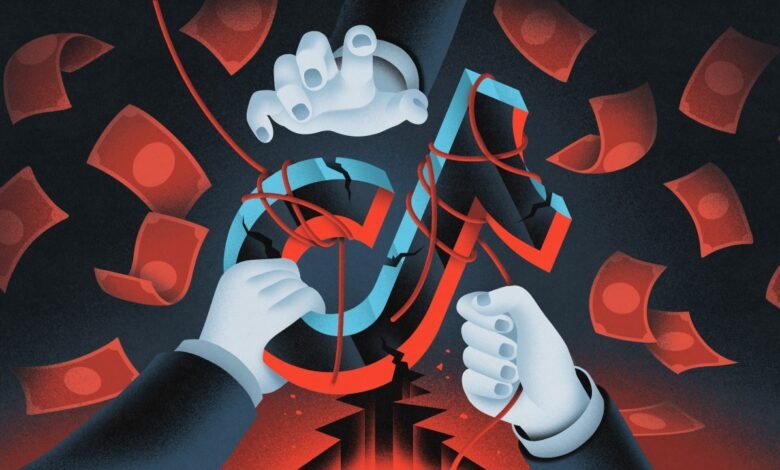TikTok and the Retreat from Technological Globalization

On January 18th, at around 10:30 P.M, the social platform TikTok went dark in the United States. It remained unavailable to American users for a grand total of about fourteen hours. Then it reappeared. Thus far, that brief shutdown marks the extent of the consequences that TikTok and its Chinese parent company, ByteDance, have suffered in the months since Joe Biden signed a law, last April, mandating that the platform be sold, at least in part, to American stakeholders, or else be banned in the U.S. Just before Donald Trump’s Inauguration, he began reassuring TikTok, and the tech companies that support it, that he would not enforce the ban—though his first Administration had been the one to initiate a crackdown on the app because of its influence by the Chinese government. On January 20th, Trump issued an executive order to effectively extend TikTok’s deadline by seventy-five days; last week, on April 4th, he extended it by another seventy-five days. The second extension puts to rest any idea that TikTok will disappear again, and makes some kind of business arrangement to preserve its U.S. presence appear all but inevitable.
ByteDance and the U.S. government had reportedly been nearing a deal that was slated to be announced last week. According to the Times and other outlets, it would have involved the American database company Oracle and tech-investment firms, perhaps including Andreessen Horowitz and Susquehanna, the latter of which is already a stakeholder in ByteDance. Those companies would take larger stakes in an American spinoff of TikTok, bringing its portion of direct Chinese ownership under the twenty-per-cent threshold required by the 2024 law. But Trump’s announcement of steep global tariffs last Wednesday, on what he dubbed his Liberation Day, deterred the Chinese parties from finalizing the deal. As of Wednesday, Trump has announced a hundred-and-twenty-five-per-cent tariff on goods imported from China, measures that the Chinese government has described as “bullying.”
TikTok has become a bargaining chip in an escalating trade war. “China changed the deal because of tariffs,” Trump said, while speaking with reporters on Air Force One on April 6th. “If I gave a little cut in tariffs, they’d approve that deal in fifteen minutes.” TikTok already existed in a kind of limbo before last week, but now its strange state of in-betweenness is intensified: it is both alive and dead, allowed to persist but technically illegal. Trump, who may have benefitted from its audience’s attention during the 2024 election, cannot let it be banned, lest he disappoint his young, extremely online constituency and undermine his reputation for dealmaking. ByteDance, in turn, cannot be seen as wholly giving in to the President’s whims, nor can it easily afford to lose its sizable American user base. For the company to refuse to come to any agreement around a sale or an investment would seem to prove that TikTok’s technology is as invasive and susceptible to pressure from the Chinese government as both houses of Congress once agreed that it was.
Over the past few decades, the largest American tech companies have served as forces of globalization. Billions of people around the world began using Google, Facebook, and Apple’s iPhones, and the success of those companies seemed to reflect the dominance of the U.S. on the world stage. American social networks have played a role similar to that of McDonald’s or Starbucks when the chains proliferated internationally and, by the late nineties, came to symbolize expanding U.S. influence. In a 2024 book titled “Machine and Sovereignty,” the Hong Kong philosopher Yuk Hui described technological globalization as an era when “modern Western technology becomes a global phenomenon and the common aim of human development.” Now governments around the world are attempting to bring these companies to heel, subjugating them to the aims of nationalist politics rather than allowing their products to spread freely. Global tech companies are becoming table stakes in the struggle to establish whatever new world order is emerging out of an inflamed Europe, a self-secure China, an expansionist Russia, and a United States under Trump, who appears to be willing to sacrifice the interdependence that defined the era of free trade.
The evidence of a retreat from technological globalization goes beyond the TikTok negotiations. According to the Wall Street Journal, Mark Zuckerberg seems to be encouraging Trump to use tariffs to pressure the European Union to back down on its enforcement of online data privacy with its Digital Markets Act, which has established regulations that hurt Meta’s ability to sell advertising there. The notion of “sovereign artificial intelligence”—a nation’s ability to produce A.I. technology without foreign labor or infrastructure—has been popularized by the microchip maker Nvidia and adopted as a goal by various governments, which are investing in massive homegrown data centers. As with military drones or spy satellites, each country aspires to develop A.I. models that it controls outright. A.I. tech, from the consumer level upward, is becoming an increasingly nationalistic project, with products such as Mistral in France and DeepSeek in China challenging the dominance of OpenAI. In the earlier days of the public A.I. race, OpenAI seemed to be to A.I. what Facebook was to social networking: a single American product for everyone on earth. Now it faces real competition.
According to Hui, an alternative to technological globalization is “technodiversity,” a system in which many similar technologies coexist, each with its own priorities and design. This notion may be threatening to Silicon Valley C.E.O.s, who see their companies as nation-states unto themselves. But it’s not necessarily bad for individual users, who may see an expansion of possibilities in online communication, social media, and artificial intelligence. Hui argued that technodiversity can enable not just more digital competition but manifold ways of living and interacting with one another. The online landscape lately has felt stuck in a deadlock, controlled by a few giant corporations. A “fragmentation,” Hui wrote, could offer a way to “exit the impasse.” That might mean that some social networks don’t function in certain countries, or that an American A.I. model works differently from a Japanese one or a French one. The negotiations over the TikTok ban are not simply a referendum on the app’s ability to addict children or to exert covert Chinese influence over an American user base. TikTok is not so unique, or so uniquely potent; an Americanized TikTok will still be just as addicting and just as manipulative in service to its new corporate stakeholders. Rather, the battle over TikTok is about both sides trying to maintain a political grip on as much digital technology as possible. ♦




